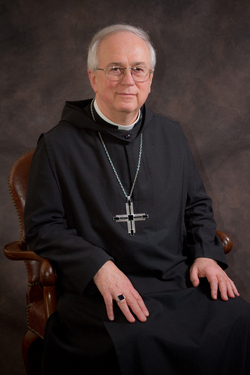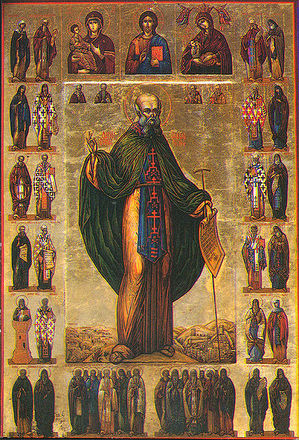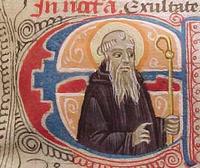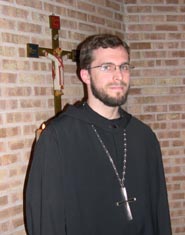 Today, the solemnly professed monks of Saint Procopius Abbey, elected Father Austin G. Murphy as their 10th abbot.
Today, the solemnly professed monks of Saint Procopius Abbey, elected Father Austin G. Murphy as their 10th abbot.
Tag: abbot
Damien Toilolo elected abbot of St Andrew’s Abbey, Valyermo
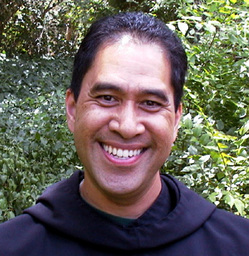 The monks of Saint Andrew’s Abbey, Valyermo (CA) gathered to elect a new abbot, Damien Toilolo on June 22, replacing Abbot Francis who stepped down two years ago. The new abbas is the second elected abbas of St Andrew’s.
The monks of Saint Andrew’s Abbey, Valyermo (CA) gathered to elect a new abbot, Damien Toilolo on June 22, replacing Abbot Francis who stepped down two years ago. The new abbas is the second elected abbas of St Andrew’s.
St Andrew’s Abbey is an abbey of the Annunciation Congregation.
Abbot Damien, until now, has served the Benedictine community as the Prior Administrator. But he’s also been the vocation director, postulant director, novice master and sub-prior.
Abbot Hugh Anderson: new abbot president for the American Cassinese Congregation
 Yesterday, Thursday, 17 June, the delegates to the General
Yesterday, Thursday, 17 June, the delegates to the General
Chapter elected Abbot Hugh Richard Anderson OSB to a six-year term as the
fifteenth President of the American-Cassinese
Congregation. The fiftieth general chapter was convened at St. Bernard Abbey, Cullman, Alabama, 13-18
June 2010.
reasons of health, midway through his second term as president which became
effective 16 June.
the time of his election, had served as the eighth abbot of Saint Procopius Abbey, Lisle, Illinois,
having served from 1985-2002. The Benedictine community of monks of Saint
Procopius was founded in Chicago in 1885, became a conventual priory in 1887, an
abbey in 1894; the abbey transferred to its present location in Lisle, IL in 1914.
Hugh’s election was confirmed by Archabbot Douglas Nowicki OSB, the Second
Councilor. In St Bernard’s abbey church Abbot Hugh celebrated a Mass of
Thanksgiving and concluded the Mass with the singing of the Te Deum.
Saint Vincent’s Archabbot re-elected
Archabbot Douglas R. Nowicki, O.S.B., 65, the eleventh Archabbot
of Saint Vincent Archabbey, was re-elected as the major superior of the
Benedictine community in Latrobe Pennsylvania on Tuesday, May 11.
In his role as
the Archabbot of Saint Vincent Archabbey, Archabbot Douglas serves as the spiritual
leader of the first monastery established in the United States and one of the
largest monasteries in the world with nearly 175 monks. As archabbot, he is the chancellor of Saint Vincent
College and Saint Vincent Seminary.
The Benedictines operate the Benedictine
Military School in Savannah, Georgia, and the Penn State Campus Ministry
Program at State College, Pennsylvania.
In addition to his responsibilities in
this country, the Archabbot is also the spiritual leader of monasteries in
Brazil and Taiwan.
May God grant Archabbot Douglas abundant blessings today and in the years ahead.
Saint Benedict, pray for us.
Saint Vincent de Paul, pray for us.
NB: Beg the Holy Spirit for graces upon the Benedictine abbeys of Saint Procopius and Marmion (both in the greater Chicago area) who will be electing new abbots this summer.
Pope Benedict to go to Monte Cassino & calls abbots and abbesses to join him
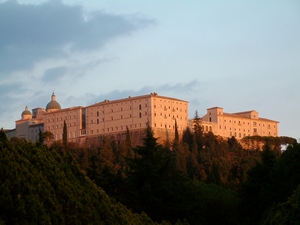 On May 24, 2009, Ascension Sunday, the Holy Father will go to Monte Cassino. He’ll visit the diocese, the archabbey and the Polish Cemetery. This pastoral visit recalls the anniversary of the bombardment of the abbey and city during the Second World War. The Pope will first celebrate Mass at the foot of the mountain and later in the day visit the monastery to celebrate Vespers. He’s requested Abbot Pietro Vittorelli to call together the world’s abbesses and abbots to pray with him at the tomb of Saint Benedict for the world. This is a particular moment of unity for the Benedictine order.
On May 24, 2009, Ascension Sunday, the Holy Father will go to Monte Cassino. He’ll visit the diocese, the archabbey and the Polish Cemetery. This pastoral visit recalls the anniversary of the bombardment of the abbey and city during the Second World War. The Pope will first celebrate Mass at the foot of the mountain and later in the day visit the monastery to celebrate Vespers. He’s requested Abbot Pietro Vittorelli to call together the world’s abbesses and abbots to pray with him at the tomb of Saint Benedict for the world. This is a particular moment of unity for the Benedictine order.
The Holy Father will make other pastoral engagements while in Cassino. He was last in Cassino in November 2004 and Pope John Paul II was at Monte Cassino 29 years ago.
Saint Saba, abbot
The just man will flourish like the palm tree. Planted in the courts of God’s house, he will grow great like the cedars of Lebanon. (Psalm 91:13-14).
Lord our God, in your providence you raised up blessed Saba to foster the monastic life and to defend and uphold the truth of the faith. May we always live that truth in love and serve only you until we attain everlasting joy and glory.
A hagiographical note:
There are several “Saint Saba (Sava),” among the liturgical calendars. This man, Saint Saba the abbot (439-532) whom we honor today, is a Cappadocian monk and priest.
Saint Saba is of particular importance for several reasons, three that are key for us: 1.) his attention to Christian maturity; 2.) his attention to correct teaching about Jesus; and 3.) his composing of a monastic rule, known as the “Jerusalem Typikon” for liturgical rites used in the Palestinian Churches (used till the 19th century).
Saint Saba is revered by monks of the East and West because he was an example of anchorite living, that is monks living in hermitages and coming together periodically for communal activities. Saba is the founder of monasteries. In a manner of speaking, Saba was influential in other monastic rules that are in exist today.
He is invoked for rain, healings and relief of temptations by Satan.
Pope Benedict meets with Benedictines
On 20 September 2008, Pope Benedict XVI met with the Benedictine abbots and abbesses at Castel
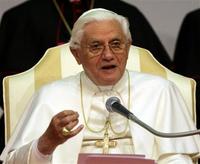 Gandolfo, his summer residence.
Gandolfo, his summer residence.
The Pope’s address in Italian is found here while we wait for the English translation. The Zenit summary is here.
The Catholic News Agency makes this report.
Vatican Radio posted this story.
In part the Pope Benedict said: the witness of the Benedictine monks, nuns and sisters is particularly important “in a de-sacralized world and an age marked by the worrying culture of the void and the absurd. This is the reason why your monasteries are places where men and women, also in our age, run to seek God and to learn to recognize the signs of the presence of Christ, of his charity and of his mercy.”
The Pope asked the Benedictines to “allow themselves to be led by the profound desire to serve all men with charity, without distinctions of race or religion,” and to found new monasteries “where Providence calls you to establish them.”
The Pope focused the attention of the Benedictine superiors to the work of evangelization and to formative and cultural work that can be done particularly in Europe, “especially in favor of the new generations. Dedicate yourselves to young people with renewed apostolic ardor, as they are the future of the Church and of humanity. To build a ‘new’ Europe, it is necessary to begin with the new generations, offering them the possibility to profoundly approach the spiritual riches of the liturgy, of meditation and of lectio divina.” [While the pope has Europe on his mind he would also support this building up of Catholic culture in the new world, too.]
The abbots are in Rome at an international congress held every 4 years.
